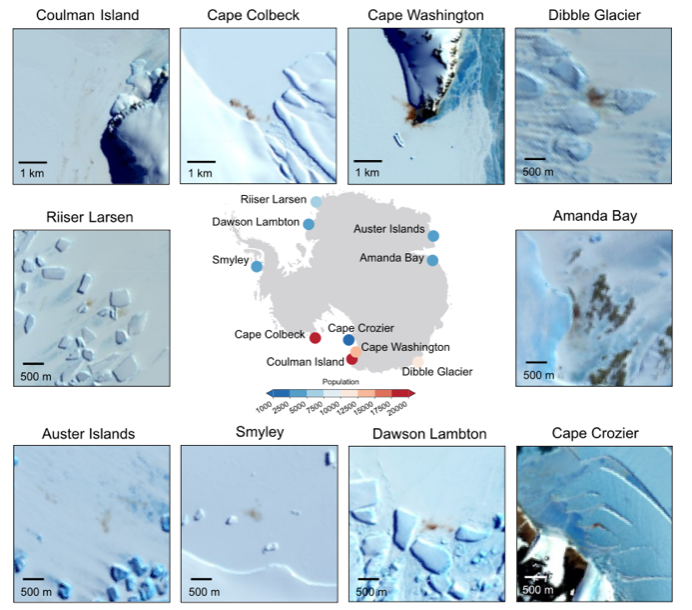Emperor penguins in Antarctica are forced to move 73 meters for every 1 C increase in temperature, according to an 11-year satellite tracking study led by Sun Yat-sen University (SYSU) researchers.
The study, recently published in the journal Remote Sensing of Environment, provides quantifiable evidence of how climate change is fragmenting the habitats of one of the Antarctic's most iconic species.
Hong Lin, a doctoral student in SYSU's School of Geospatial Engineering and Science and author of the study, developed a unique "guano index." This method uses satellite imagery to observe the concentration of emperor penguin droppings—large, dark-colored stains visible from space—to track changes in their breeding habitats over the past 11 years.

Distribution of 10 key emperor penguin colonies as seen in satellite imagery
Climate extremes drive habitat dispersal
The findings revealed that these major colonies are relocating frequently due to the intense pressure from climate extremes. Climate extremes—including high temperatures, heavy snowfall, storms, and dangerously low sea ice concentration—substantially impact the duration and spatial distribution of penguin habitats.
"As a result, the affected colonies are driven into more fragmented and short-lived habitats," Lin said. "In many cases, some breeding sites are abandoned within three years, with penguins relocating to new grounds over 4 kilometers away".
Growing risks for penguin's habitats
The emperor penguin is currently listed as "Near Threatened" by the International Union for Conservation of Nature and faces the risk of becoming endangered. Under human-induced climate change, their habitats are fragmenting at a measurable and alarming rate.
The researcher warned that if global emission reduction efforts stall, emperor penguins will be forced to migrate even further to breed, significantly diminishing their likelihood of success. Climate models indicate that Antarctica will warm by 1.3 C under low-emissions scenarios (with clean energy) and by a catastrophic 4.8 C under high-emissions scenarios (with fossil fuels) by the end of the century.

Emperor penguins on Nansen Ice Shelf. Photoed by Zheng Lei
Lin emphasized that the penguins' plight is a microcosm of the Antarctic ecosystem's challenges and a direct consequence of stalled global climate policy.
The research not only demonstrates the vulnerability of emperor penguins but also establishes a new satellite-based method for monitoring polar species—reinforcing SYSU's strength in geospatial science and ecological research. Professor Xiao Cheng serves as the corresponding author of the study, which was supported by national research grants.
Link to the paper:https://www.sciencedirect.com/science/article/pii/S0034425725003888?via%3Dihub=



